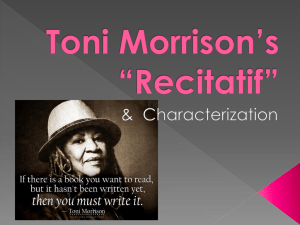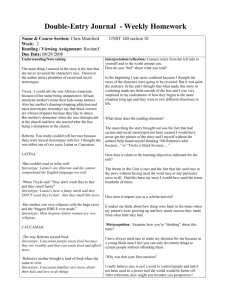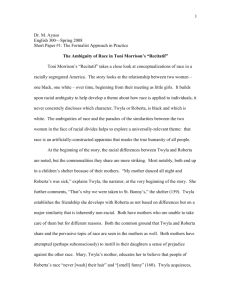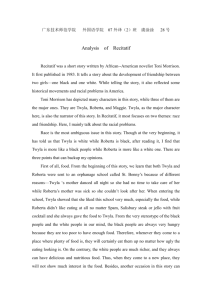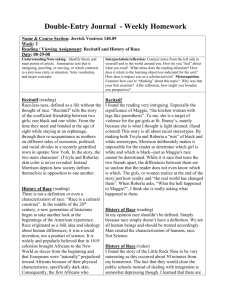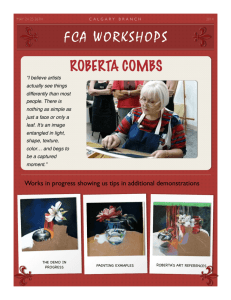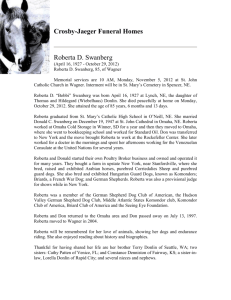The Semiotics of Race: Using Toni Morrison's “Recitatif” to Expose
advertisement
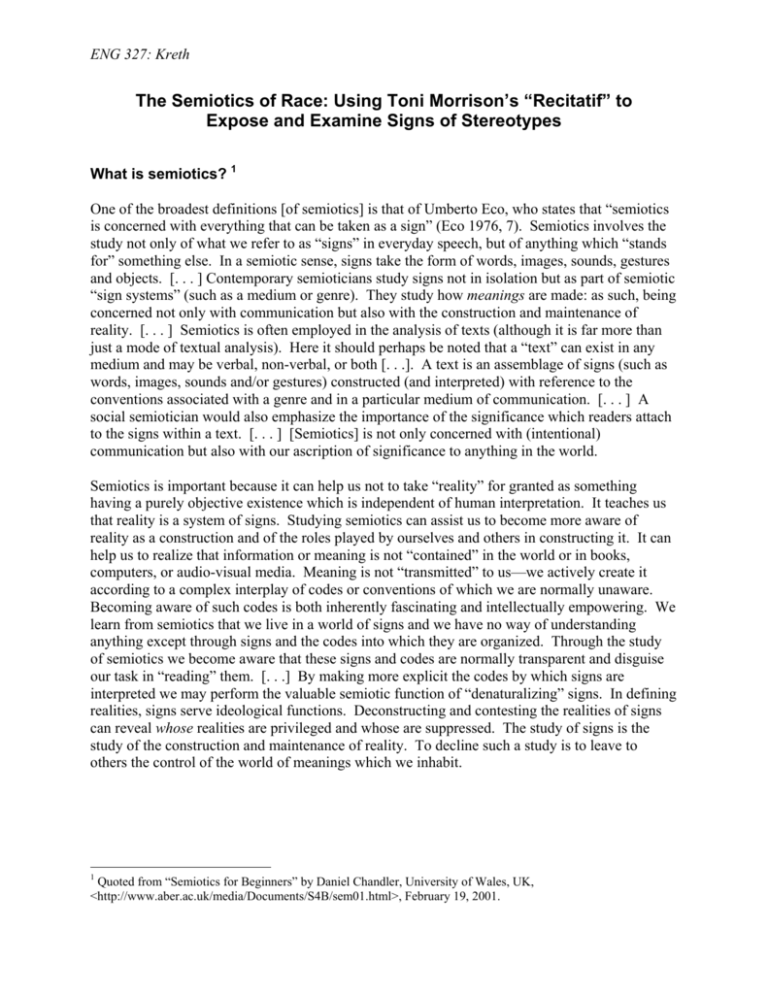
ENG 327: Kreth The Semiotics of Race: Using Toni Morrison’s “Recitatif” to Expose and Examine Signs of Stereotypes What is semiotics? 1 One of the broadest definitions [of semiotics] is that of Umberto Eco, who states that “semiotics is concerned with everything that can be taken as a sign” (Eco 1976, 7). Semiotics involves the study not only of what we refer to as “signs” in everyday speech, but of anything which “stands for” something else. In a semiotic sense, signs take the form of words, images, sounds, gestures and objects. [. . . ] Contemporary semioticians study signs not in isolation but as part of semiotic “sign systems” (such as a medium or genre). They study how meanings are made: as such, being concerned not only with communication but also with the construction and maintenance of reality. [. . . ] Semiotics is often employed in the analysis of texts (although it is far more than just a mode of textual analysis). Here it should perhaps be noted that a “text” can exist in any medium and may be verbal, non-verbal, or both [. . .]. A text is an assemblage of signs (such as words, images, sounds and/or gestures) constructed (and interpreted) with reference to the conventions associated with a genre and in a particular medium of communication. [. . . ] A social semiotician would also emphasize the importance of the significance which readers attach to the signs within a text. [. . . ] [Semiotics] is not only concerned with (intentional) communication but also with our ascription of significance to anything in the world. Semiotics is important because it can help us not to take “reality” for granted as something having a purely objective existence which is independent of human interpretation. It teaches us that reality is a system of signs. Studying semiotics can assist us to become more aware of reality as a construction and of the roles played by ourselves and others in constructing it. It can help us to realize that information or meaning is not “contained” in the world or in books, computers, or audio-visual media. Meaning is not “transmitted” to us—we actively create it according to a complex interplay of codes or conventions of which we are normally unaware. Becoming aware of such codes is both inherently fascinating and intellectually empowering. We learn from semiotics that we live in a world of signs and we have no way of understanding anything except through signs and the codes into which they are organized. Through the study of semiotics we become aware that these signs and codes are normally transparent and disguise our task in “reading” them. [. . .] By making more explicit the codes by which signs are interpreted we may perform the valuable semiotic function of “denaturalizing” signs. In defining realities, signs serve ideological functions. Deconstructing and contesting the realities of signs can reveal whose realities are privileged and whose are suppressed. The study of signs is the study of the construction and maintenance of reality. To decline such a study is to leave to others the control of the world of meanings which we inhabit. 1 Quoted from “Semiotics for Beginners” by Daniel Chandler, University of Wales, UK, <http://www.aber.ac.uk/media/Documents/S4B/sem01.html>, February 19, 2001. ENG 327: Kreth Relevant “Signs” of Racial Stereotypes Description Location Twyla doesn’t at first know what to think of Roberta, but Twyla remembers and agrees with something her mother has told her, that people who are of Roberta’s race “never washed their hair and they smelled funny.” p. 682 Both girls “were eight years old and got F’s all the time. Me [Twyla] because I couldn’t remember what I read or what the teacher said. And Roberta because she couldn’t read at all and didn’t even listen to the teacher. She wasn’t good at anything except jacks, at which she was a killer. . . .” p. 682 Twyla: “The food was good, though. At least I though so. Roberta hated it and left whole pieces of things on her plate: Spam, Salisbury steak—even Jell-O with fruit cocktail in it, and she didn’t care if I ate what she wouldn’t. [My mother’s] idea of supper was popcorn and Yoo-Hoo. Hot mashed potatoes and two weenies was like Thanksgiving for me.” p. 683 While at St. Bonny’s, the girls witness something terrible in “the orchard,” two to four aces of apple trees near the orphanage, a place where “older” girls hang out to “listen to the radio” and “dance” (these descriptions are also perhaps euphemisms for sexual activities they engaged in among themselves). Twyla: “Maggie fell down there once. The kitchen woman with legs like parentheses. And the big girls laughed at her. We should have helped her up, I know, but we were scared of those girls with lipstick and eyebrow pencil. Maggie couldn’t talk. The kids said she had her tongue cut out, but I think she was just born that way: mute. She was old and sandy-colored and she worked from early in the morning till two o’clock, and if she was late, if she had too much cleaning and didn’t get out till two-fifteen or so, she’d cut through the orchard so she wouldn’t miss her bus and have to wait another hour. She wore this really stupid little hat—a kid’s hat with ear flaps—and she wasn’t much taller than we were. A really awful little hat. Even for a mute, it was dumb—dressing like a kid and ever saying anything at al.” p. 683 The girls’ mothers come for a Sunday visit: Twyla: “I saw [my mother] right away. She had on those green slacks I hated and hated even more because didn’t she know we were going to chapel? And that fur jacket with the pocket linings so ripped she had to pull to get her hands out of them. But her face was pretty—like always—and she smiled and waved like she was the little girl looking for her mother. . . . But I couldn’t stay mad at [my mother] while she was smiling and hugging me and smelling of Lady Esther dusting powder. . . . and I was feeling proud because she looked so beautiful even in those ugly green slacks that made her behind stick out.” p. 684-85 Note: Lady Esther is a German cosmetics company, and has been around since 1913. Twyla: “I am left-handed.” p. 685 Twyla: “[Roberta’s mother] was big. Bigger than any man and on her chest was the biggest cross I’d ever seen. I swear it was six inches long each way. And in the crook of her arm was the biggest Bible ever made. . . . Roberta’s mother just looked down at me and looked down at [my mother] too. She didn’t say anything, just grabbed Roberta with her free hand and stepped out of line, walking quickly to the rear of it. [My mother] p. 685 ENG 327: Kreth Description Location was still grinning because she’s not too swift when it comes to what’s really going on. Then this light bulb goes off in her head and she says, ‘That bitch!” really loud . . . . Why did I think she could come there and act right? . . . We were supposed to have lunch in the teacher’s lounge, but [my mother] didn’t bring anything . . . [Robert’s mother] brought chicken legs and ham sandwiches and oranges and a whole box of chocolate-covered grahams. Roberta drank milk from a thermos while her mother read the Bible to her.” Several years later, in the 1960s Twyla: “I was working behind the counter at the Howard Johnson’s on the Thruway just before the Kingston exit. Not a bad job. Kind of a long ride from Newburgh, but okay once I got there.” Note: In the 1960’s, Newburgh and surrounding areas were almost exclusively white. Roberta is in the Howard Johnson’s with two “hairy” men, and it is at this point we learn that Roberta’s last name is “Fisk.” Twyla describes Roberta’s appearance thus: “Her own hair was so big and wild I could hardly see her face. But the eyes. I would know them anywhere. She had on a powder-blue halter and shorts outfit and earrings the size of bracelets. Talk about lipstick and eyebrow pencil.” p. 686-87 Roberta: “We’re on our way to the coast. He’s got an appointment with Hendrix.” She gestured casually to one of the boys next to her. Twyla: “Hendrix? Fantastic,” I said. “Really fantastic. What’s she doing now?” Roberta coughed on her cigarette and the two guys rolled their eyes up at the ceiling. Roberta: “Hendrix. Jimi Hendrix, asshole. He’s only the biggest—Oh, wow. Forget it.” Note: Jimi Hendrix had a mostly white following. Several years later, in the 1970 or 80s Twyla is now married: “[James] liked my cooking and I liked his big loud family. They have lived in Newburgh all of their lives and talk about it the way people do who have always known a home. . . . James and his father talk about fishing and baseball and I can see them together on the Hudson in a raggedy skiff. Half the population of Newburgh is on welfare now, but to my husband’s family it was still some upstate paradise of a time long past. . . . But the town they remembered had changed. Something quick was in the air. Magnificent old houses, so ruined that they had become shelter for squatters and rent risks, were bought and renovated. Smart IBM people moved out of their suburbs back into the city and put shutters up and herb gardens in their backyards.” p. 687-88 Twyla sees Roberta in Newburgh’s new “gourmet” food store: Twyla: “Where are you? Here? In Newburgh? Roberta: “Yes. Over in Annandale.” . . . “Now I’m Mrs. Kenneth Norton.” . . . The two proceed to separate checkouts and agree to meet outside the store: “She was waiting for me and her huge hair was sleek now, smooth around a small, nicely shaped head. Shoes, dress, everything lovely and summery and rich. I was dying to know what happened to her, how she got from Jimi Hendrix to Annandale, a p. 688-89 ENG 327: Kreth Description Location neighborhood full of doctors IBM executives. Easy, I though, Everything is so easy for them. They think they own the world. . . . And then I saw the dark blue limousine.” Note: Annandale is an upper class neighborhood in the Newburgh area. The two women discuss their husbands and children: Twyla’s husband is a fireman and Roberta’s is an IBM executive. They then find themselves talking about the Maggie incident: Twyla: “Remember Maggie? The day she fell down and those gar girls laughed at her?” [. . .] Roberta: “Maggie didn’t fall,” she said. Twyla: “Yes, she did. You remember.” Roberta: “No Twyla. They knocked her down. Those girls pushed her down and tore her clothes. In the orchard. . . . And Bozo [the superintendent] was fired.” Twyla: “You're crazy. She was there when they I left. You left before me.” Roberta: “I went back. You weren’t there when they fired Bozo. . . . Once for a year when I was ten, another for two months when I was fourteen. That’s when I ran away. . . . You’ve blocked it, Twyla. It happened. Those girls had behavior problems.” . . . p. 690-91 Twyla: “Why can’t I remember the Maggie thing?” Twyla then changes the subject to their last meeting at the Howard Johnson’s: Twyla: “Were you on dope or what that time at Howard Johnson’s?” I tried to make my voice sound friendly. Roberta: “Maybe, a little. I never did drugs much. Why?” Twyla: “I don’t know, you acted sort of like you didn’t want to know me then.” Roberta: “Oh, Twyla, you know how it was back in those days; black—white. You know how everything was.” Twyla: But I didn’t know. I thought it was just the opposite. Busloads of blacks and whites came into Howard Johnson’s together. . . . and blacks were very friendly to whites in those days. Later that fall: Twyla: “Strife came to us that fall. At least that’s what the paper called it. Strife. Racial strife. . . . I couldn’t figure it out from one day to the next. I knew I was supposed to feel something strong, but I didn’t know what, and James wasn’t any help. [Our son] was on the list of kids to be transferred from the junior high school to another one at some farout-of-the-way place and I thought it was a good thing until I heard it was a bad thing. I mean I didn’t know. All the schools seemed dumps to me, and the fact that one was nicer looking didn’t hold much weight. . . . So I forgot about it, until I found myself driving along Hudson Street out there by the school they were trying to integrate and saw a line of women marching. And who do you suppose was in line, big as life, holding a sign in front of her bigger than her mother’s cross? MOTHERS HAVE RIGHTS TOO! It said. Twyla: “What are you doing?” Roberta: “Picketing. What’s it look like?” p. 692 ENG 327: Kreth Description Location Twyla: “What for?” Roberta: “What do you mean, ‘What for?’ They want to take my kids and send them out of the neighborhood. They don’t want to go.” Twyla: “So what if they go to another school? My boy’s being bussed to, and I don’t mind. Why should you?” Roberta: “It’s not about us, Twyla. Me and you. It’s about our kids.” Twyla: “What’s more us than that?” Roberta: “Well, it is a free country.” Twyla: “Not yet, but it will be.” Roberta: “What the heck does that mean?” I’m not doing anything to you.” Twyla: “You really think that?” Roberta: “I know it.” Twyla: “I wonder what made me think you were different.” Roberta: “I wonder what made me think you were different.” Twyla: “Look at them,” I said. “Just look. Who do they think they are? Swarming all over the place like they own it. And now they think they can decide where my child goes to school. Look at them, Roberta. They’re Bozos.” Robert’s co-picketers surround Twyla’s car and “gently, gently, began to rock it.” After the police disburse the picketers, Roberta and Twyla resume they’re discussion: Roberta: “Maybe I am different now, Twyla. But you’re not. You’re the same little state kid who kicked a poor old black lady when she was down on the ground. You kicked a black lady and you have the nerve to call me a bigot.” [. . . ] p. 693 Twyla: “She wasn’t black,” I said. Roberta: “Like hell she wasn’t, and you kicked her. We both did. You kicked a black lady who couldn’t even scream.” Twyla: “Liar!” Roberta: “You’re the liar! Why don’t you just go home and leave us alone, huh?” Twyla goes home and makes her own picket sign: “I had a decent sign: red spray-painted letters on a white background—AND SO DO CHILDREN****. I meant just to go down to the school and tack it up somewhere so those cows on the picket line could see it, but when I got there, some ten or so others had already assembled—protesting the cows across the street. . . . The second day there was name calling and finger gestures. . . People changed signs from time to time, but Roberta never did and neither did I. Actually my sign didn’t make sense without Roberta’s. “And so do children what?” one of the women on my side asked me. Have right, I said, as if it was obvious. . . . Still, I couldn’t tell if [Roberta] saw me and knew my sign was for her. . . . As soon as she hoisted her MOTHERS HAVE RIGHTS TOO I began to wave my new one, which said, HOW WOULD YOU KNOW? I know she saw p. 693 ENG 327: Kreth Description Location that one, but I had gotten addicted now. My signs got crazier each day, and the women on my side decided that I was a kook. . . . I brought a painted sign in queenly red with huge black letters that said, IS YOUR MOTHER WELL? Roberta took her lunch break and didn’t come back for the rest of the day or any day after. Two days later I stopped going too and couldn’t have been missed because nobody understood my signs.” Twyla thinks about what Roberta has told her about the Maggie incident: “I was puzzled by her telling me Maggie was black. When I thought about it I actually couldn’t be certain. She wasn’t pitch black, I knew, or I would have remembered that. What I remember was the kiddie hat and the semicircle legs. I tried to reassure myself about the race thing for a long time until it dawned on me that the truth was already there, and Roberta knew it. I didn’t kick her, I didn’t join in with the gar girls and kick that lady, I but I sure did want to. . . . Maggie was my dancing mother. Deaf, I thought, and dumb. Nobody inside. Nobody who would hear you if you cried in the night. Nobody who could tell you anything important that you could use.” p. 694 At some unspecified Christmas season in the future, Twyla bumps into Roberta in a diner. Roberta, who is dressed in a silvery gown and dark fur coat, confesses: Roberta: “Listen to me. I really did think [Maggie] was black. I didn’t make that up. I really thought so. But now I can’t be sure. I just remember her as old, so old. And because she couldn’t talk—well, you know, I thought she was crazy. She’d been brought up in an institution like my mother was and like I thought I would be too. And you are right. We didn’t kick her. It was the gar girls. Only them. But, well, I wanted to. I really wanted them to hurt her. I said we did it, too. You and me, but that’s not true. And I don’t’ want you to carry that around. It was just that I wanted to do it so bad that day—wanting to is doing it.’ . . . Oh, shit, Twyla. Shit, shit, shit. What the hell happened to Maggie?” The end. p. 695
